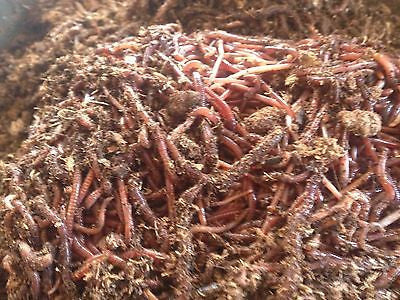Red Wiggler Worms available - Sustainable Waste Management Service
Red Wiggler Worms available - Sustainable Waste Management Service
Blog Article
Red Wiggler Worms Demystified: Unlocking the Keys of Vermiculture for Greener Living and Nutrient-Rich Dirt
In the realm of lasting methods for improving dirt high quality and advertising eco-conscious living, red wiggler worms play a pivotal yet typically neglected role. Red Wiggler Worms. Comprehending the complexities of caring for these worms, enhancing their atmosphere, and utilizing their castings can lead to a greener way of life and healthier dirt for plants to flourish.
The Duty of Red Wiggler Worms
Red Wiggler worms play an important duty in composting systems by effectively damaging down raw material into nutrient-rich castings. These starved eaters take in a selection of organic materials, such as kitchen scraps, lawn waste, and paper products. As they feed, the worms' digestion procedures break down the organic matter right into a penalty, dark, and nutrient-dense material known as worm castings or vermicompost.
The spreadings generated by Red Wiggler worms are very valuable for dirt wellness and plant development. They are abundant in necessary nutrients like nitrogen, phosphorus, and potassium, which are vital for supporting healthy plant development. Additionally, worm spreadings include useful microbes and enzymes that aid boost soil structure, rise water retention, and boost nutrient uptake by plants.
Advantages of Vermicomposting

It enhances dirt framework, improves dirt aeration, and boosts dirt dampness retention. Vermicompost also improves the soil with important nutrients like potassium, nitrogen, and phosphorus, advertising plant growth and total soil fertility.
In addition, vermicomposting supports lasting gardening practices by providing a chemical-free and all-natural choice to synthetic plant foods. Red Wiggler Worms. This eco-friendly technique not just enriches the soil but also helps in reducing dependence on harmful chemicals, advertising a greener and more lasting way of horticulture
Establishing a Worm Bin
When establishing a worm bin for vermicomposting, appropriate arrangement is important to ensure the success of the composting process. The first action in establishing up a worm bin is choosing an appropriate container.
After including the bed linen, present the red wiggler worms to the container. The worms should after that be offered with food scraps such as fruit and vegetable peels, coffee grounds, and eggshells.
On a regular basis check the moisture degrees and temperature level in the worm container to make certain optimum conditions for the worms. With appropriate arrangement and maintenance, the worm bin will properly convert natural waste into nutrient-rich compost for your plants and garden.
Collecting Worm Spreadings
To effectively collect nutrient-rich worm spreadings from your vermicomposting system, a methodical harvesting technique is essential. There are a few crucial actions to comply with to make sure an effective process when it comes time to harvest the worm spreadings. First of all, quit adding fresh food scraps away of the worm container for a number of weeks before harvesting. This urges the worms to move to the side with fresh bed linens and food, making it easier to dig the spreadings from the opposite side.

Troubleshooting Common Issues
Identifying and resolving common obstacles that might occur during the vermicomposting process is critical for preserving a productive and healthy and balanced worm bin. Including excess food scraps can lead to a buildup of wetness and level of acidity in the worm container, possibly damaging the worms. Another concern is undesirable smells emanating from the worm bin.
In addition, if the worm populace is decreasing or the worms show up harmful, it might be due to ecological stressors such as extreme temperature levels or pH degrees. Keeping track of these factors and making necessary adjustments is vital for the health of the worms. By fixing these typical issues promptly, vermicomposters can make sure a smooth and successful vermicomposting procedure while visit homepage maintaining a prospering worm populace.

Verdict
In verdict, red wiggler worms play a crucial function in vermiculture by damaging down organic issue right into nutrient-rich soil. Establishing up a worm bin is necessary for successful vermiculture, and collecting worm castings gives important compost for gardening.
As they feed, the worms' digestion procedures break down the organic issue right into a fine, dark, and nutrient-dense product known as worm castings or vermicompost.
The castings generated by Red Wiggler worms are extremely helpful for dirt wellness and plant development. Including excess food scraps can lead to a build-up of wetness and level of acidity in the worm container, potentially hurting the worms.Additionally, if the worm population is decreasing or the worms appear harmful, it could be due to environmental stress factors such as extreme temperature levels or pH degrees. Establishing up a worm container is important for successful vermiculture, and gathering worm castings provides useful garden compost for horticulture.
Report this page